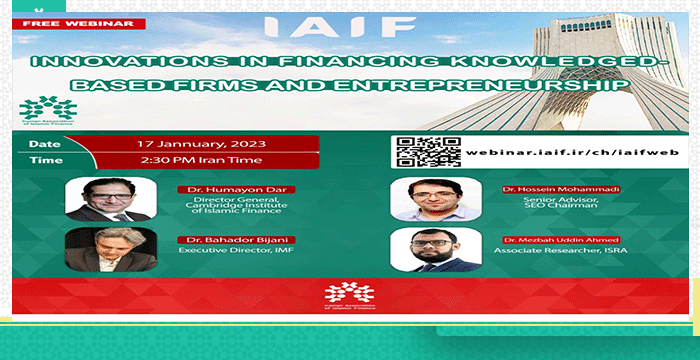
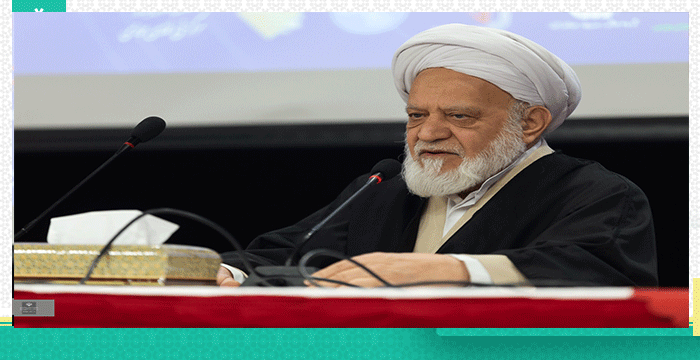
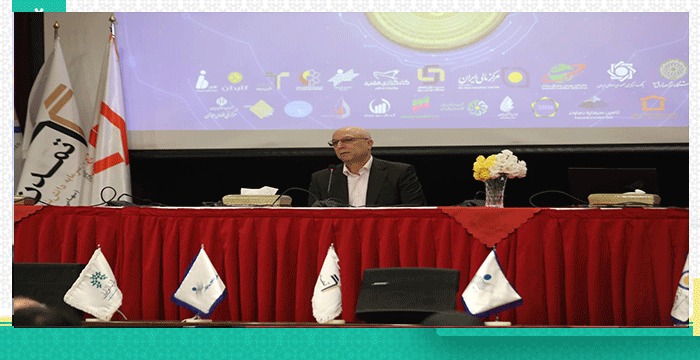
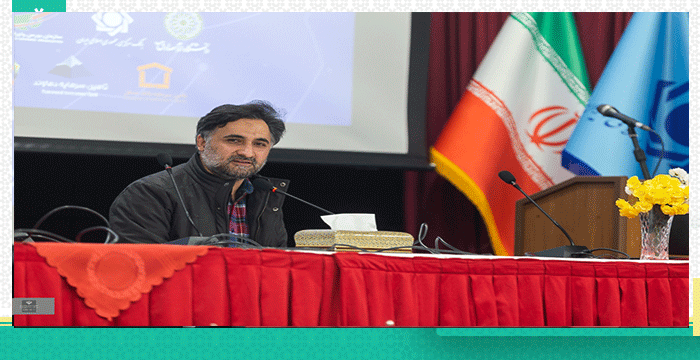
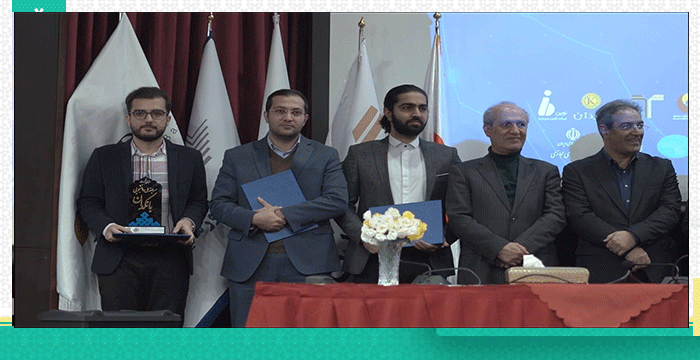
The Iranian Association of Islamic Finance held its 8th annual conference on Innovations in Financing Knowledge-Based Firms and Entrepreneurs on 17 January, 2023.
Dr. Ali Saleh Abadi, President of the Iranian Association of Islamic Fianace (IAIF),
while welcoming the guests of the 8th Islamic Finance Conference, he presented a report on the activities of the IAIF.
Referring to the establishment of the IAIF in 2015, he said since it was established, the association has followed a growing path by the grace of God, and it has been rated A for four consecutive years by the Ministry of Science. It can be said that winning the title of the best association of the country in the year 1400 at the Farabi International Festival shows the growing path of the association, and for this reason, I appreciate each and every member of the association, especially the respected members of the board of directors and the activists of the association.
According to Dr. Saleh Abadi, introduction of books, publications, official reports, Fiqu courses, professors, researchers, etc. in the field of Islamic finance, uploading more than 600 Islamic finance articles published in Persian Islamic finance publications in the last ten years along with thematic classification, creation of access links to the libraries of the country's universities, listing and diagrammatic classification of capital market sciences, uploading the resolutions of the Shariah Committee of the Securities and Exchange Organization and the Shariah Council of the Central Bank, the classification of fatwas in 19 topics, presenting suggested topics for master's theses and doctoral theses in accordance with the country's current needs in the financial field, presenting a full report (text, video and professors’ presentation file) of the meetings , webinars, thesis defense sessions and IAIF’s conferences and creation of Dr. Mousavian's dedicated page including books, articles, clips and professor's lectures are among the most important parts of the association's website.
Dr. Saleh Abadi said holding MBA and DBA courses in the Islamic capital market is one of the other important programs of the association, so far 170 students have participated in the DBA course and 24 people have participated in the MBA courses.
Dr. Gholamreza Mesbahi Moghadam, Head of the CBI’s Shariah Council
He said indeed, the Iranian Association of Islamic Finance has left many important works in the recent years. One of the things has done is to finance knowledge-based companies. A memorandum of understanding was inked between Qarzul-Hasana Mehr Bank of Iran and the President's Department of Science and Technology, in which a thousand knowledge-based companies will be financed in the form of Qarz-ul-Hasana. Each company will receive 500 million Tomans in Qarz Al-Hasana. This amount in the form of Qarz-Al-Hasana is very great and such works should be developed.
He mentioned that one of the tasks that was followed up in the last two sessions of the Central Bank's Shariah Council and came to a conclusion is the issue of Qarz Al-Hasna service fees. Previously it was done with a 4% cost rate by banks. While it must be based on the total cost and taken for one time. Therefore, Shariah scholars sowed a positive reaction to it. The cost rate is going to be calculated once and must be less that 4 percent.
Dr. Rouhollah Dehghani, Head of the Vice Presidency for Science and Technology
He said in the last 12 years, 8 thousand knowledge-based companies have been established in Iran.
If the knowledge-based companies Support Law is implemented correctly, we will definitely reach a correct economic model and the 10% share of knowledge-based companies in the gross national product will be realized, Dehghani said.
He went on to say that it is essential to people to touch knowledge based economy in their lives because people are the main pillar of stability and growth in each society.
He emphasized that it is the people who give credit and value to the governments and financial systems and heat up or stagnate the market of a product. Because people act on the basis of a collective intelligence that is completely intelligent and alert. Therefore, if the impact of knowledge-based economy is felt in people's lives, we can hope that people's liquidity will enter the knowledge-based flow. He stressed that after natural resources, the biggest economic opportunity of a country is made up of brains, talents and owners of science and technology. He pointed to talents, cheap and brilliant manpower, low energy costs and infrastructures and considered it a suitable opportunity for the scientific and technological development of the country, adding we should try to benefit from these existing advantages in the right way.
He reiterated in order to gain new achievements we must have new tools. For example, in order to realize modern banking, we need to have a modern banking system, and this does not happen in the context of traditional banking.
Dehghani said the presence of young people is necessary to achieve these changes, stating in order to have a new financing system and obtain innovative financial technologies, we must take advantage of the capabilities of our young scientists.
Dr. Mohammad Ali Zolfi Eshghi, Minister of Science Research and Technology
He said juxtaposing ideas and funds can help the country's growth, and conditions should be created so that owners of ideas can be juxtaposed with investors then a good event will happen.
He went on to say knowledge-based production offers quality and incomparable products because its basis is creativity and innovation, adding knowledge-based economy creates employment for elite and highly educated people; the cost of creating jobs for people with higher education is several times more than the people with low education; therefore, creating job opportunities for well-educated people must be in the field of knowledge-based economy.
He mentioned our elites and researchers have good ideas, if they are supported financially, will lead to the production of a product or technology and can solve an important need of the country. Moreover, the country's officials in the field of science and technology expect from associations such as the Iranian Association of Islamic Finance to provide a solution in the field of sharing ideas and capital.
The first panel on the role of money, capital and insurance markets in financing knowledge-based activities
The panelists were Dr. Fereydoun Rahnamai Roudposhti, Secretary General of the Financial Engineering Association (MC), Dr. Shapour Mohammadi, Member of the faculty of Tehran University, Mr. Meysam Hamedi, Head of the Research, Development and Islamic Studies Center of the SEO, Dr. Ali Fanadi, Member of the executive board and vice president of central insurance planning and development and Dr. Saeed Shawalpour, Member of the faculty and CEO of Science, Technology and Research Fund.
Dr. Shapour Mohammadi
He talked about various kinds of financing methods for knowledge-based companies, including:
Granting short and long-term facilities for buying office, office supplies, etc.
Debt-based crowdfunding
Using the resources of the Innovation and Prosperity Fund
Managed funds and group facilities
And so on.
Also Dr. Rahnama pointed out that in the world there are three crowdfunding methods that are very compatible with the financing of knowledge-based companies, which are debt, equity and social methods. The social part of crowdfunding in knowledge-based companies can be very effective. It depends on the fact that the statement of the knowledge-based company is well explained and the supervisor, intermediary and trustee are clearly stated, so it can attract investors.
Dr. Ali Bonyadi Naini
At the beginning of his speech, he said we have three pillars in financing institutions in the world. Money market, capital market and insurance market. The insurance industry can contribute to both the development of technology and knowledge-based activities from two perspectives. First, it invests and secondly, it facilitates the investment of others. One of the major issues we have in knowledge-based companies is risk management. The role of the insurance industry is to reassure those who invest in the knowledge-based field.
Knowledge-based companies develop knowledge activities.
When we have knowledge based companies, attention to entrepreneurship and innovation is serious.
ُThere are various financing models in insurance companies such as reinsurance and non-reinsurance ones. Life insurance is the basis of investment in financing mega projects. But there are some requirements to develop this tool. The first one is to increase the penetration rate of life insurance.
Second, the development of life insurance and third, the legal requirements that focus on insurance in the field of life.
The methods of facilitating investment by the insurance industry are as follows:
1- To rely on the companies and VCs that invest in this field. 2- Product quality insurance of knowledge-based companies 3- Product liability insurance 4- Paying attention to parametric insurances 5- Issuance of reinsurance bonds 7- Helping to issue innovation bonds 8- Credit insurance of crowdfunding 9- Reinsurance of venture capital 9- Development of insuretech. Indeed, we seek to develop an ecosystem in the insurance industry with a focus on open innovation.
Dr. Meysam Hamedi When we talk about financing knowledge-based companies we need to focus on the process, not on a single point. But in the world a Pre IPO Stage for startup companies is set and the companies get prepared to reach the IPO Stage. The capital market plays the main role. If you do not reach this stage, other methods should be done to improve the situation such as crowdfunding, venture funds or private funds, to help the company reach a new stage. For example, the task of crowdfunding is to accompany the company to reach the IPO stage and bring it to the capital market.
There should be a process to encourage non-stock manufacturing companies to be listed to the stock exchange and over-the-counter, and this encouragement can be supported by various institutions. Next, we need to have specialized institutions to prepare companies for market acceptance. Like what is in other countries. From this day on, it is necessary that a preparation process should take place before these companies, especially start-up companies, enter the capital market. For example, in England, there are listing process consultants who do proper due diligence to prepare the company to be listed in the capital market. One of the good things that happened is the innovation sukuk that we should think of such new methods and implement them.
Dr. Shawalpour
When we say that technological innovation is a very complicated and risky path that requires proper financing in the previous positions, so if they are not done correctly and perfectly, we will face semi-bankrupt companies that bank insurance and capital instruments are not suitable for them . If we want to bring a company from the R&D stage to the economy, we have a very difficult task ahead of us.
But financing innovation is easier. Because the innovation that we say is the economy based on technology and it is mainly formed in the platform sphere and we see many successful IPOs in the market. Many of them are in the innovation area, therefore, this is an opportunity to develop tools. The remarkable thing is that when we say knowledge-based economy, we need more technological innovation in our country. For example, in equipment, etc., these issues are related to science and technology which we need in the country. Software development is a technological innovation that requires money. On the whole it is not easy to find investors for and it is a challenge. Hence we feel the depth of the need for investment.
Second Panel:
Requirements for the development of Islamic financial innovations in financial markets
Dr. Hosseini, CEO of Iran Export Development Bank (Moderator)
He said a healthy economy has three components:
1. In a healthy economy, innovation is emphasized and must be taken seriously.
2. The economy must be productive
3. Any healthy economy requires transparent, liquidable and efficient financial markets.
Dr. Mehran Moharmian, Head of New Technologies Division at Central Bank of Iran
He said when we talk about Islamic financial technologies, we are talking about fintechs that have a halal label. The total economy of Iran in 2025 is estimated to be around 5 trillion dollars, and the consumption of goods and services is estimated to be around 2 trillion dollars. If we want to look at the breakdown of financial assets in 2021, Iran has been identified as one of the big countries in this field.
The priorities of empowering Islamic financial technologies in 2022 can be stated as follows:
1. Capital
2. Finding Talent
3. Geographic expansion
4. Regulation
5. New Emerging Technologies
Different approaches of regulators in facing financial technology are:
1. Observation
2. Testing and learning
3. Facilitator of innovation
4. Redesigning articles
Dr. Nasserpour, Head of financial institutions Observation Division at the Securities and Exchange Organization
He said if we want to define innovation, it is as follows:
Financial innovation is the activity of creating and then generalizing instruments, technologies, and institutions of new financial markets. Financial innovation consists of any way in which financing and the financial system are modernized. What is usually referred to innovation, can be divided into two parts:
1. Inventing instruments
2. Application development
Types of financial innovation:
1. Using development instruments
Increasing liquidity in the market, accessibility to funds by attracting new investors and facilitating access to credits.
2. Using risk management tools
Hedging, sharing and redistribution of financial risk.
3. Asset securitization bonds
He pointed out to the current approaches for designing new financial instruments in Islamic countries, which are as follows:
1. The approach of imitating and copying common instruments in the capitalist system cathelic among some countries with dual Islamic and liberal financial systems.
2. The approach of resolving jurisprudential conflict from modern tools designed and applied in western financial systems and their use by applying some changes and reforms in the Islamic financial system (signature approach).
3. The transformation approach which started by examining the needs of the society and evaluating the instruments according to these needs, then selects the needed instruments.
Regarding the upcoming challenges, he said:
1. Reducing the necessary incentives to design new financial instruments and institutions according to the desired long-term horizon of profitability.
2. Long duration of approval of new financial instruments.
3. The lack of practical financial knowledge of some financial managers of production and service companies and their lack of support.
4. Lack of necessary platforms for private supply of new financial markets.
5. Weakness of international communication with developed financial markets.
Dr. Ali Abdullahi, CEO of National Informatics Company
He said requirements and characteristics of transformative technologies are as follows:
1. Changing business rules
2. Disturbing the rules of governance
3. Decentralization
4. Changing product and service development strategies
5. High risk tolerance
6. High growing trend
Solutions for the development of innovation in the field of financial technology:
1. Companionship and participation: Attending startup meetings, visiting accelerators, having knowledge of trends, applications and risks and new technologies in creating innovation hubs and advisory committees
2. Education: Educating and raising awareness about complex issues of technologies and conducting research and development activities in new areas
3. Testing: Testing technologies in a safe environment to ensure the sustainability of Sand BOX development is important
Dr. Behnam Mohseni, CEO of Tamadon Investment Bank
Regarding the importance of the knowledge-based economy, he said:
1. Knowledge-based economy means production and consumption based on intellectual assets. Specifically, the ability to commercialize knowledge and apply the results of research and development.
2. Various researches in developing and developed countries indicate the significant and tremendous effect of the knowledge-based economy on the economic growth of countries.
3. As the population gets aged and the reduction of natural resources occurs, the most important source of economic growth in the future will be knowledge-based development.
4. The main capital of knowledge-based companies is intellectual property and human capital. The main activity of knowledge-based companies is to convert knowledge into products. Interestingly, the share of physical assets and natural resources in these companies is less than other companies.
The results of not paying attention to knowledge-based financing are as follows:
1. Lack of proper financing always challenges the development of knowledge-based enterprises.
2. The capital gap means insufficient financing of knowledge-based companies and the loss of part of the growth potential in this field.
3. In order to solve the capital gap, the capital market needs Islamic financial innovations in the development of financial instruments and institutions for efficient and sufficient financing of knowledge-based companies.
He added the existing models of knowledge-based financing in the world are implemented in 4 ways:
1. Intellectual Property Funds: They invest in intellectual property such as patents.
2. Debt based on intellectual property: It allows companies to borrow from banks or financial institutions by pledging their intellectual property.
3. Small bonds: Debt bonds that are issued in the bond market of small and medium companies.
4. Bonds that can be converted into shares: It is an effective instrument for those companies that do not have a high credit rating and fixed assets, but have a high growth potential.
The International Panel of the 8th Annual Conference of the Iranian Association of Islamic Finance
Innovations in Financing Knowledge-Based Firms and Entrepreneurs
Dr. Homayun Dar, Director General, Cambridge Institute of Islamic Finance
He said our institute is knowledge-based. If we have a traditional view of financing knowledge-based companies, the public sector is probably the first option that comes to our mind or the cheapest capital that can be used in this sector.
Many universities are funded through government funds or philanthropic institutions. Although the financing of universities through state funds can meet the need, currently a modern phenomenon called financing knowledge-based centers such as universities through the private sector has become a practice and the reason is that the market gives them a good profit. Such as are Google, Facebook, Twitter, etc., which earn significant income by processing and providing information and services.
He emphasized that in Cambridge Institute of Islamic Finance, which is a small knowledge-based institute, we have adopted the market-oriented method. Currently, there are many different organizations that are funded by government resources and in my opinion, this is not the most efficient use of financing. Of course, I am not going to ignore them. For example, the Asian Development Bank or the International Monetary Fund, which do countless research works. Despite all the benefits of financing some institutions through government resources, these institutions are generally not as efficient as private sector institutions.
For example, the provision of services in institutions that are financed through the private sector is fast and dynamic, while in public institutions we do not see such benefits due to bureaucracy.
Currently, there are many financial resources that are willing to be allocated in private sector knowledge-based companies.
He also mentioned that there is a need to cooperate with the International Monetary Fund in advancing the programs of knowledge-based companies and I believe that Islamic finance should cooperate with knowledge-based companies through financing. It is expected that by the end of 2022, the Islamic finance industry’s market size to reach $3.3 trillion and a part of this significant figure can be used to provide capital in knowledge-based companies to create wealth in countries.
Dr. Bahador Bijani, Executive Director, the International Monetary Fund
I am going to talk about the role of the International Monetary Fund (IMF) in Islamic finance. I want to talk about the activities of the IMF in Islamic banking and the cooperation of the IMF with other international institutions that are active in the field of Islamic finance.
The activity of the International Monetary Fund in Islamic banking dates back to the 1980s, in which it published articles in this field. Also, IMF determined policies and guidelines in the field of Islamic finance in the second half of the 1990s, and many countries started establishing banks with an Islamic approach. Of course, the International Monetary Fund had not defined an important policy in terms of legal and regulatory issues until 2005.
There is a remarkable point about the International Monetary Fund, which has played a mediating role in the establishment of the IFSB. In the late 1990s, the need for a standard-setting institution in the field of Islamic finance was felt. The central banks of some countries and the AAOIFI held meetings, and the International Monetary Fund accelerated the consultation process for the formation of the IFSB in 2012.
Also, the International Monetary Fund has worked closely with other Islamic financial institutions, including the Islamic Development Bank. The attention of the International Monetary Fund to Islamic finance is increasing. In the International Monetary Fund, there is a section called the monetary capital market. This section establishes policies that accelerate the cooperation of Islamic banks in the framework of monetary policy to have a roadmap and regulations in the field of Islamic finance.
Dr. Hossein Mohammadi, Senior Advisor to the CEO of SEO
When we talk about the knowledge-based economy in Iran, it’s referred to start-ups that are based on advanced technologies. It should be noted that high risk also leads to high income. Also, financing for the development of such a part of the economy requires the attention of professional investors and other people to the importance of risk, and by acquiring knowledge, one must be able to manage its risks.
Knowledge-based companies in Iran, England, and even in the United States are prone to falsifying products or even stealing ideas from others, which causes sensitivity in their financing. Therefore, a mechanism for financing them should be specified and actors should be employed in this field so that knowledge-based companies are able to return it for receiving finance.
Since the amount of risk in the knowledge-based part cannot be estimated, it is possible that a knowledge-based company may lose all its assets due to the lack of previous experience in the field that produced the product. If we compare this issue with investment in the field of steel production, then this issue will be more noticeable. For example, in the field of steel production, the amount of income and risk can be estimated according to previous data, but there is no such approach in the field of knowledge-based companies.
Those who usually work in the field of knowledge-based activities do not have a deep understanding of business and the reason is that they are scientists or very scientific people.
To have a good funding and income in the field of knowledge- based activities, we need to identify or create what can be encouraged. Of course, there is a difference between reality and creating a wave of passion for something.
He also mentioned that we must create a professional market that consists of 2 parts, and the first part is allocated to professional investors and companies with advanced technology, and professional investors invest in them. The second part of the market should be allocated to investors who are not interested in technology fields, but have a desire to invest in knowledge-based companies whose products have become a financial instrument and whose risk can be estimated.
Dr. Mezbah Uddin Ahmed, Associate Researcher, ISRA
He said preferred shares confer certain advantages to investors that help them mitigate their risk. Venture investors commonly require that they receive preference shares when investing in startups.
AAOIFI Shari’ah Standard No. 21 Financial Paper says it is not permissible to issue preference shares that have special financial features leading to the granting of priority to these shares at the time of liquidation or the distribution of profits. It is permitted to grant certain shares features related to procedural or administration matters, in addition to the rights attached to ordinary shares, like voting rights
Shariah Advisory Council (SAC) of Securities Commission Malaysia ruled that non-cumulative preference shares are permissible based on tanazul where the right to profit of the ordinary shareholder is willingly given to a preference shareholder. Tanazul is agreed upon at an annual general meeting of a company which decides to issue preference shares in an effort to raise new capital. As it is agreed at the meeting to issue preference shares, this means that ordinary shareholders have also agreed to give priority to preference shareholders in dividing the profits, in accordance with tanazul. In the context of preference shares, tanazul means surrendering the rights to a share of the profits based on partnership, by giving priority to preference shareholders. It is also known as isqat haq in Islamic jurisprudence.
• Preference shares bear the ruling of Musharakah
• The following are declared permissible:
- Waiver of right by the OS holders to the PS holders: Based on Tanazul or Al Wa`d bi al-Hibah
- Waiver of Right by the PS holders to the OS holders: Based on Tanazul
- Few important points:
- Cumulative PS: The amount of dividend to be paid is subject to the availability of profit and declared by the company on the financial year of the dividend payment. If there is no available profit on the maturity or redemption date of PS, the company will not declare any dividend and will not pay such accumulated dividends to PS holders.
- Convertible PS: Conversion method used must be agreed by the contracting parties and has no element of capital guarantee by the company to PS holders, such as the price of OS to be received must be subjected to the market value at the point of conversion.
- Redeemable PS: The redemption method that can be implemented is limited to the following:
(i) Redemption of PS based on the market value of PS on the redemption date;
- Redemption of PS based on the current performance of the company; or
- Redemption of PS through ratification by the Board of Director of the company.
Referring to Shariah Screening Methodology, he said
The 5% benchmark is applicable to the following businesses/activities:
• Conventional banking and lending
• Conventional insurance
• Gambling
• Liquor and liquor-related activities
• Pork and pork-related activities
• Non-halal food and beverages
• Tobacco and tobacco-related activities
• Interest income* from conventional accounts and instruments (including interest income awarded arising from a court judgement or arbitrator)
• Dividends* from Sharīʿah non-compliant investments
• Sharīʿah non-compliant entertainment
• Other activities deemed non-compliant according to Sharīʿah principles as determined by the sac.
For the above-mentioned businesses/activities, the contribution of Sharīʿah non-compliant businesses/activities to the revenue or profit before taxation of the MSME must be less than five per cent.
*Interest income and dividends from Sharīʿah non-compliant investments should be compared against the revenue.
The 20% benchmark is applicable to the following businesses/activities:
• Rental received from Sharīʿah non-compliant activities
• Other activities deemed non-compliant according to Sharīʿah principles as determined by the SAC
For the above-mentioned businesses/activities, the contribution of Sharīʿah non-compliant businesses/activities to the revenue or profit before tax of the MSME must be less than 20 per cent.
Cash over total assets
Cash only includes cash placed in conventional account(s) and/or instrument(s).
The ratio, which is intended to measure ribā and ribā-based elements within a company’s statements of financial position, must be less than 33 per cent.
Debt over total assets
Debt only includes interest-bearing debt.
The ratio, which is intended to measure ribā and ribā-based elements within a company’s statement of financial position, must be less than 49 per cent.
Giving Award to Top Teams of Bankdan National Student Competition
The ending ceremony of the Bankdan national student competition was an important part of this conference.
This competition started in June with the participation of 341 students in the form of 89 teams from more than 40 universities of the country. The top teams received their awards.
The main themes of the entrance exam for BANKDAN Competition were:
- Principles of banking
- Principles of bank accounting
- The concept of money history and banking
- The nature of the commercial bank
- Commercial bank financial statements
- Internal banking
- Central Banking
- Islamic banking (contracts, instruments, etc.)
- Updated statistics of the monetary-banking area
- Basics of financial management
The BANKDAN competition process was as follows:
1) Enrolling on the site;
2) Attaining the minimum required score in the entrance exam as a team;
3) Participating in the competition training course;
4) Attaining the minimum required score in the final exam of the training course as a team;
5) Going among the top 16 teams in the first round of the competition:
- Answering to the questions raised by the Scientific Committee in a written form;
- Having face-to-face debates;
-Making a specialized clip.
6) Going among the top 8 teams in the second round of the competition:
- Answering to the questions raised by the Scientific Committee in a written form;
- Having face-to-face debates.
7) Holding an advanced training course for 4 final teams;
8) Holding the semifinals of the competition:
- Answering to the questions raised by the Scientific Committee in a written form;
- Having face-to-face debates.
9) Holding the final competition:
- Answering to the questions raised by the Scientific Committee in a written form;
- Having face-to-face debates;
- Making a specialized clip.
10) Appreciating the top 3 teams in the tournament;
11) Introducing the top people to the institutions.


